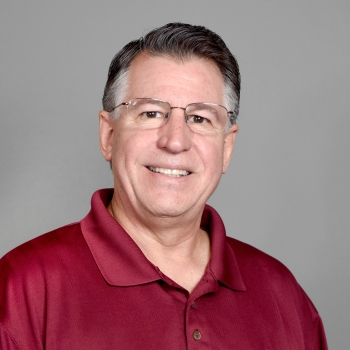Entrepreneur-turned-ASU-professor imparts servicemembers with valuable interpersonal skills
David Thomas might hold a degree in ocean engineering, but today he calls the desert home.
The Southern California native’s relocation to the Valley of the Sun was preceded by years of working for defense contractors in the U.S. and Europe, gaining experience in underwater acoustics and anti-submarine warfare, international program management and the launch of airborne sonar initiatives.
After years of leadership, consulting and project management positions, he decided he wasn’t ready to retire. Instead, Thomas went looking for the next chapter of his career.
The opportunity to teach and develop courses for the then-new Bachelor of Arts in interdisciplinary studies at Arizona State University intrigued him enough to trade ocean waves for heat waves.
In 2021, ASU partnered with the United States Naval Community College (USNCC) to offer the military studies associate degree program through ASU Online, available to active-duty, enlisted service members. Since then, the partnership has expanded to include two additional degree programs: organizational leadership and logistics (maritime).
Thomas’ contributions to the development of coursework in organizational leadership resulted in the course Behavioral Dynamics in Organizations, a foundational course for the degree in organizational leadership.
“It has been a gratifying experience working with USNCC students, particularly considering my early professional involvement with the Navy on their airborne sonar initiatives,” Thomas said. “Furthermore, individuals with substantial life and work experiences stand to derive the utmost benefit from a course like this. These students possess a wealth of experiences that they can draw upon as they contemplate the fundamental concepts associated with organizational behavior.”
ASU News spoke with Thomas to learn more about the course, the program and the experience students can look forward to.
Question: How does your course, Behavioral Dynamics in Organizations, help students pursuing this degree?
Answer: Behavioral Dynamics in Organizations explores the interdisciplinary nature of behavioral dynamics, utilizing theories, strategies and skills to enhance our ability to identify behavioral tendencies in ourselves and others. The course focuses on building more effective and productive relationships.
Students gain deeper insight into their personal, interpersonal, sociocultural and environmental perceptions. They develop self-awareness and human relations knowledge and skills, enabling them to understand and influence human performance — both as organizational leaders and in other aspects of their lives.
Regardless of your major or career goals, this course equips students with powerful tools and perspectives to elevate their career vision and life goals to the next level.
Q: In what ways will students apply concepts from this course to life inside and outside the classroom?
A: In a broad sense, students will gain an understanding of why people exhibit a diverse array of behaviors and perspectives. They will learn how to connect more meaningfully with various types of individuals, both in the workplace and in their personal lives.
The curriculum incorporates an experiential learning approach, encouraging students to apply the presented ideas in their personal and professional lives. This approach facilitates a meaningful connection with the power of understanding behavioral dynamics.
My touchstones for developing experiential courses include the following:
- Reflect: Students reflect on how key concepts relate to their own life experiences.
- Connect: Students link what they learn in OGL 220 with other aspects of their self-knowledge and ongoing exploration of leadership success strategies.
- Apply: Students take what they learn outside the classroom by engaging in conversations and eliciting feedback from their friends and associates. They then report back on their findings.
Q: What do you hope students gain from this course and the program overall?
A: Most academic programs fall short when it comes to helping students develop the transferable skills that are so vital for success in the contemporary workplace. These skills encompass effective interpersonal communication, emotional intelligence, teamwork and collaboration, creative and critical thinking, (and) the significance of demonstrating integrity and ethical behavior, to name just a few.
While our organizational leadership programs focus on imparting specific skills in organizational leadership and project management, my aspiration is for students to graduate equipped with a robust foundation and a high level of proficiency in each of these transferable skills and mindsets.
Q: What are some of the standout moments or experiences students can expect within this course?
A: Self-discovery and understanding how to make a positive impact on people's lives are unquestionably standout elements of the course. OGL 220 is replete with self-assessment opportunities designed to assist students in gaining deeper insight into their behaviors, strengths and blind spots. Students will also formulate strategies to connect more effectively with a diverse array of individuals, fostering deeper connections that influence behavior, mindset and success. It's truly an amazing journey!
Q: What do you enjoy most about teaching this course?
A: I enjoy seeing students resonate with the curriculum and begin to see the connections between what they are learning in college and how they can accomplish their own career and personal goals more effectively. Especially with students who are open-minded and mastery-oriented, the course can have a significant impact on their thoughts and behaviors, and those changes are really rewarding to watch unfold.
Q: What has been a highlight during your time teaching at ASU?
A: One of my greatest passions here at ASU over the years has been taking students abroad for both internship-based and topic-based study abroad experiences. Over the last 15 years, I’ve taken students to Great Britain, Ireland, Italy, the Czech Republic, Latvia, Lithuania, Estonia and New Zealand for study abroad experiences lasting from two to 12 weeks. Watching students go through the various stages of culture shock and begin to develop the intercultural communication and integration skills so necessary for success in the contemporary workplace is so rewarding. I believe every student should think very seriously about studying abroad at least once during their academic career. It’s probably the most powerful learning experience they will have in college.
More Business and entrepreneurship

Why consumers are flying high this holiday season
A few years ago, the airline industry was in serious trouble.The COVID-19 pandemic crippled travel, and U.S. airlines received $54 billion in taxpayer bailouts, according to the U.S. Department of…

Being kind with in-kind donations
Charities and nonprofits with retail stores must walk a fine line when accepting in-kind donations from the public.If they turn away items they can’t use, they could appear ungrateful. But if they…

ASU Chandler Innovation Center supports students, local entrepreneurs
Justin Hillsten knows about trying something over and over until it works.The Arizona State University alum and entrepreneur has worked through many iterations of his ventures, thanks to his access…
